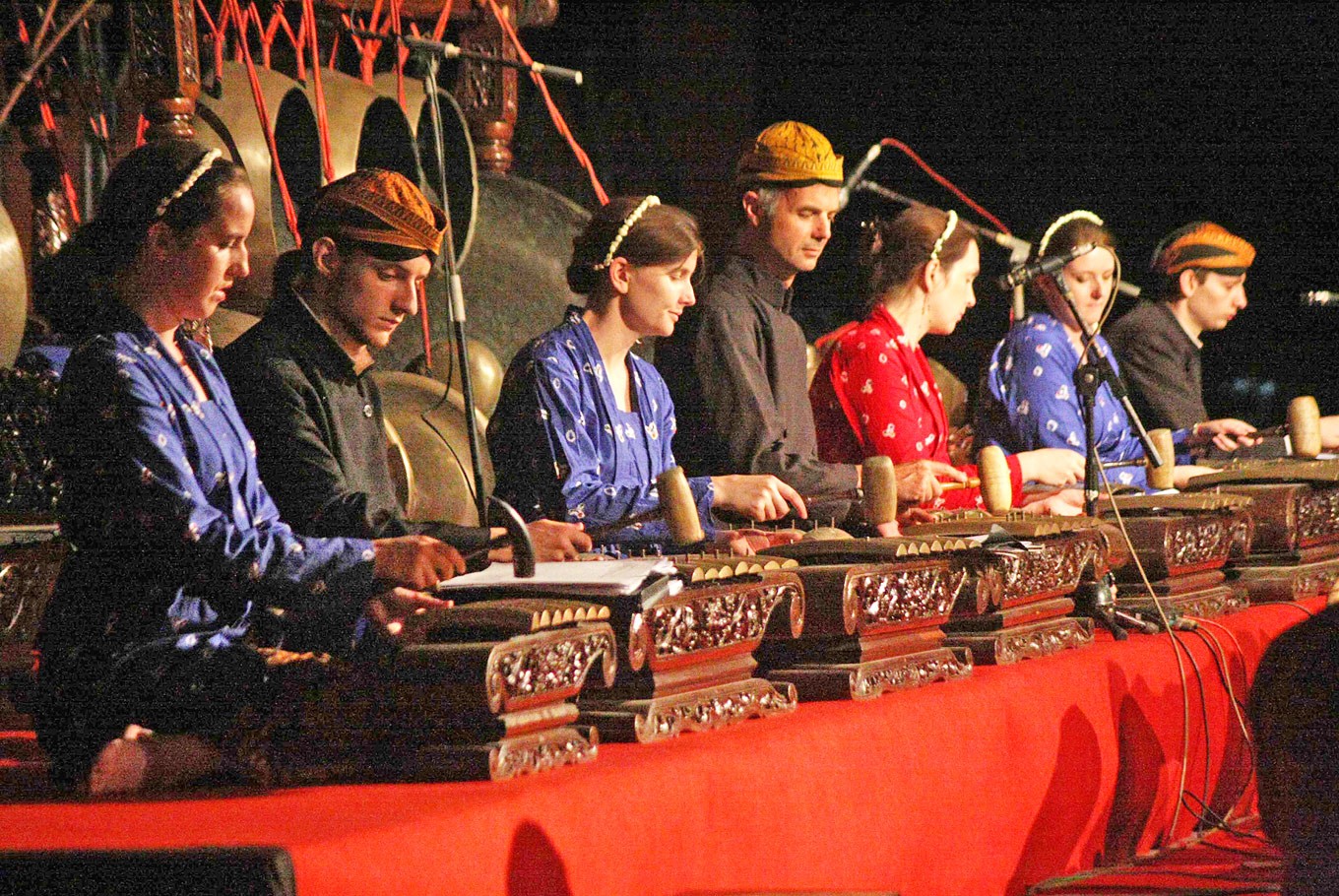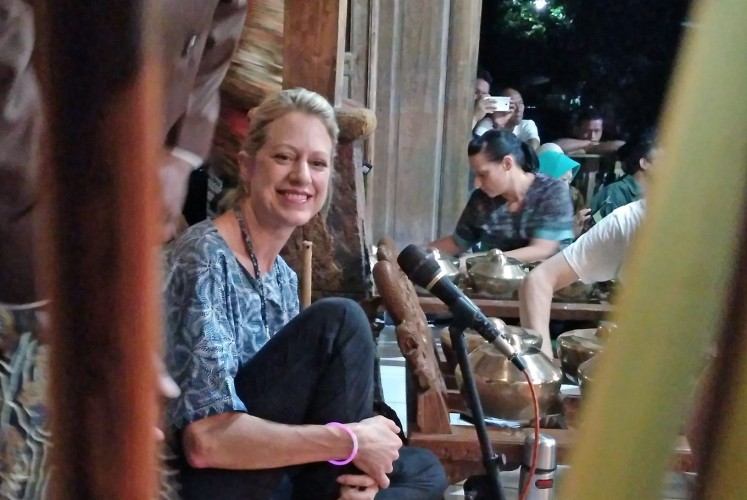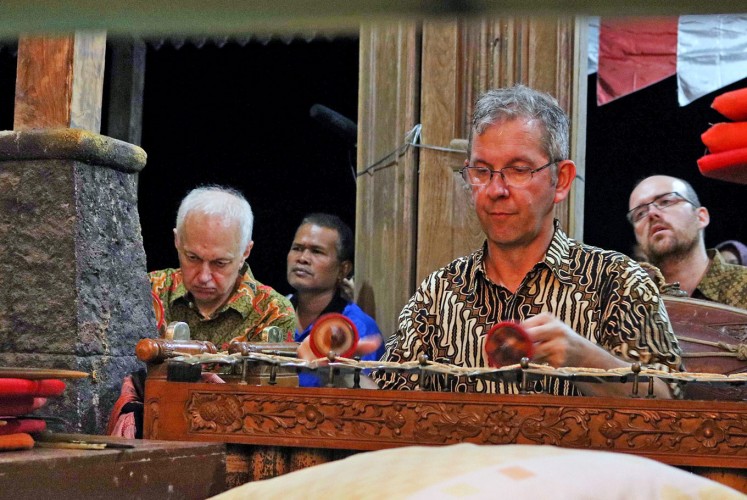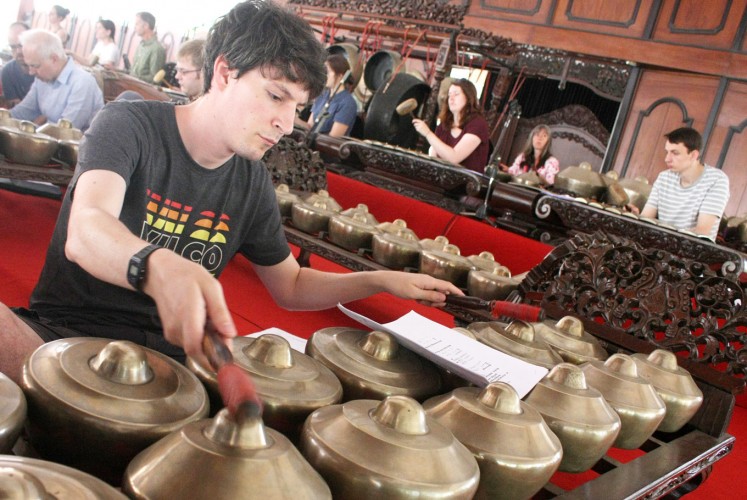Popular Reads
Top Results
Can't find what you're looking for?
View all search resultsPopular Reads
Top Results
Can't find what you're looking for?
View all search resultsSiswa Sukra a British gamelan affair
Siswa Sukra is an Indonesianist group. They love Indonesian culture, introducing and popularizing gamelan in Britain
Change text size
Gift Premium Articles
to Anyone
A
pesinden (Javanese female singer) sang a Javanese poetry song called Gending Kutut Manggung with grace and eloquence during a recent performance at the Indonesian Arts Institute (ISI) in Surakarta, Central Java.
This pesinden, however, is not your typical one. Despite her eloquence and versatility in singing Javanese songs in the traditional language, she is not Javanese. Instead, she is British and her name is Cathy Eastburn.
Eastburn performed with Siswa Sukra, a London-based gamelan group headed by Peter Smith.
Cathy Eastburn (JP/Ganug Nugroho Adi)The group’s main base is at the Royal Festival Hall in London, and the performance at ISI was part of its Gamelan Pulang Kampung (Gamelan Returns Home) tour, which also included Jakarta, Yogyakarta, Magelang and Klaten from August 5 to August 22.
“We’re visiting Indonesia, especially Solo [Surakarta] to walk down memory lane. We’re expressing our gratitude to all the instructors, because we learned how to play gamelan from this campus [ISI],” Smith said in fluent Javanese.
In 1992, Peter, who prefers to be called Parto or Pete, began his three-year study of gamelan at the campus. Before he began studying the art of gamelan, he first became acquainted with it when he was studying piano at York University in 1982.
“At the time, Professor Neil Sorrell, a lecturer at York University, brought a set of strange musical instruments to the campus. I helped unpack them. They were beautiful, with carvings of dragons, flowers and leaves. I was stunned. It was my first sight of gamelan instruments,” he recalled.
Lifelong passion: Siswa Sukra head and founder Peter Smith (second from right) playing gamelan during a practice session at ISI in Surakarta, Central Java. (JP/Ganug Nugroho Adi)Sorrell had been involved with the gamelan since the 1970s. Smith then learned gamelan from Sorrell and took classes at Southbank Center, the largest arts and cultural center in the world. Having fallen completely in love with gamelan, Smith then decided to leave his piano study.
Smith eventually met Prasdiyanto, an ISI gamelan lecturer, during an Indonesian arts festival at the Indonesian Embassy in 1990. From Prasdiyanto, Smith obtained a scholarship recommendation to study gamelan in Indonesia in 1992.
“I should have spent only a year in Solo, but I stayed there for three years. Even now I still frequently travel back and forth, even twice a year. Solo reminds me of the village atmosphere during my childhood,” he said.
Returning from Indonesia in 1995, Smith taught gamelan on campuses like Oxford University, Kingston University and Southbank Center to students ranging from beginner to advanced level.
Smith remembered how difficult it was during the initial phase to introduce gamelan to people in Britain because of the instruments’ non-British origin.
He then tried to offer free gamelan practice to communities at the School of Oriental and African Studies (SOAS) and the Oxford Gamelan Society, by opening a range of classes starting with a class for seven-year-olds.
Practice makes perfect: The Siswa Sukra gamelan group trains at the Indonesian Arts Institute (ISI) in Surakarta, Central Java. (JP/Ganug Nugroho Adi)“They responded in different ways, so we took different approaches. But I like such a challenge. I love gamelan. For me gamelan is intoxicating and I want it to thrive there,” Smith said.
There were also other British gamelan experts who helped Smith during the initial phase of introducing the art to Britain.
Some of these experts were Southbank Center Gamelan Manager Sophie Ransby, who has played gamelan since she was 12, Eastburn, who has played gamelan for over 30 years and is now a famous British pesinden, and gamelan musician Richard Plockbance.
The regular meetings at Southbank Center led to them forming the Siswa Sukra gamelan group, which launched its debut in 2010 at an arts festival in London. Along with Siswa Sukra, there are about 150 gamelan groups all over Britain today.
“Siswa means students and Sukra is Friday. We chose Friday because it’s the day of our regular class meetings. So we adopted the name Siswa Sukra,” Smith said about the origin of the group’s name.
Siswa Sukra now has 25 members ranging in age from 21 to 71 with diverse social, educational and occupational backgrounds. Most of them have learned and played gamelan at Southbank Center for five to 15 years.
In Britain, Siswa Sukra has often performed in various cities, offering different kinds of Javanese music from modern gending (poetry songs with gamelan), Javanese dance melodies, to classical gending compositions from the palaces of Surakarta and Yogyakarta.
Several Siswa Sukra members have followed in Smith’s footsteps, studying gamelan at ISI-Surakarta. Among these members are Sammy Brett, a high school teacher, and Jonathan Roberts, a doctor of gamelan whose dissertation concerned non-professional gamelan groups in Surakarta.
“I’ve been playing gamelan for 21 years now. It is a remarkable kind of music because it can bring people closer together and form a family,” Jonathan, who is also a fluent Javanese speaker, said.
According to Eastburn, the beautiful sound of gamelan is not only pleasing to the ear but also serves as a remedy to relieve stress.
“Its vibrations and resonance enter the body, permeating the nerves and leading to something positive. The prison environment causes stress due to a lot of pressure and isolation. So, I think why not take gamelan to prisons,” Eastburn said.
With this conviction, Eastburn has introduced gamelan to prison inmates through various workshops.
Eastburn’s idea has now turned into a charity called Good Vibrations. In the last 13 years, around 5,000 inmates in 30 penitentiaries in Britain have received gamelan training and therapy from Eastburn and the charity.
Eastburn believes that gamelan helps people to develop self-control. Learning this Javanese music constitutes an initial step for the prison inmates to change their lives when they are released.
“For us, Siswa Sukra is an Indonesianist group. They love Indonesian culture, introducing and popularizing gamelan in Britain,” said Ahmad Mahendra from the Directorate General of Culture, Education and Culture Ministry.














